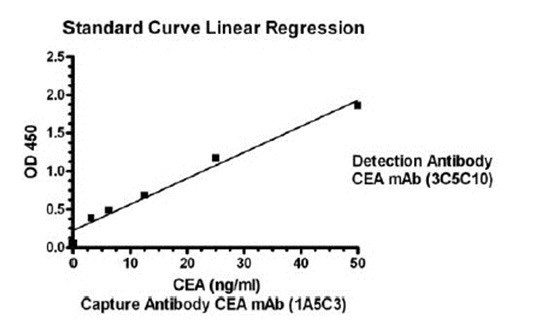Anti-CEA Antibody (1A5C3)
Mouse Monoclonal Antibody
- 产品详情
- 实验流程
- 背景知识
Application
| E |
|---|---|
| Primary Accession | P06731 |
| Reactivity | Human |
| Host | Mouse |
| Clonality | Monoclonal |
| Isotype | Mouse IgG1, κ |
| Clone Names | 1A5C3 |
| Calculated MW | 76796 Da |
| Gene ID | 1048 |
|---|---|
| Positive Control | ELISA |
| Application & Usage | ELISA Capture: 1-10 µg/ml, ELISA Detection: 0.05-0.2 µg/ml |
| Other Names | CEA, Meconium antigen 100, CD_antigen: CD66e, Carcinoembryonic antigen-related cell adhesion molecule 5 |
| Target/Specificity | Carcinoembryonic antigen |
| Antibody Form | Liquid |
| Appearance | Colorless liquid |
| Reconstitution & Storage | -20 °C |
| Background Descriptions | |
| Precautions | Anti-CEA Antibody (1A5C3) is for research use only and not for use in diagnostic or therapeutic procedures. |
| Name | CEACAM5 (HGNC:1817) |
|---|---|
| Function | Cell surface glycoprotein that plays a role in cell adhesion, intracellular signaling and tumor progression (PubMed:10864933, PubMed:10910050, PubMed:2803308). Mediates homophilic and heterophilic cell adhesion with other carcinoembryonic antigen-related cell adhesion molecules, such as CEACAM6 (PubMed:2803308). Plays a role as an oncogene by promoting tumor progression; induces resistance to anoikis of colorectal carcinoma cells (PubMed:10910050). |
| Cellular Location | Cell membrane; Lipid-anchor, GPI-anchor. Apical cell membrane. Cell surface Note=Localized to the apical glycocalyx surface |
| Tissue Location | Expressed in columnar epithelial and goblet cells of the colon (at protein level) (PubMed:10436421). Found in adenocarcinomas of endodermally derived digestive system epithelium and fetal colon. |
For Research Use Only. Not For Use In Diagnostic Procedures.
Provided below are standard protocols that you may find useful for product applications.
BACKGROUND
Carcinoembryonic antigen (CEA) is a complex glycoprotein of molecular weight 200 kDa. In healthy adults, less than 5 ng/ml of CEA is found in the serum. Elevation of CEA antigen is found in the blood of patients with cancer of the lung, liver, pancreas, breast, cervix, prostate and so on. CEA measurement is mainly used as a tumor marker to identify recurrences after surgical resection, or localize cancer spread though dosage of biological fluids. The CEA blood test is not reliable for diagnosing cancer. CEA levels may also be raised in some conditions like ulcerative colitis, pancreatitis and cirrhosis. CEA Antibody is produced from the hybridoma resulting from fusion of SP2/0-Ag14 myeloma and B-lymphocytes obtained from mouse immunized with native human CEA protein
终于等到您。ABCEPTA(百远生物)抗体产品。
点击下方“我要评价 ”按钮提交您的反馈信息,您的反馈和评价是我们最宝贵的财富之一,
我们将在1-3个工作日内处理您的反馈信息。
如有疑问,联系:0512-88856768 tech-china@abcepta.com.























 癌症的基本特征包括细胞增殖、血管生成、迁移、凋亡逃避机制和细胞永生等。找到癌症发生过程中这些通路的关键标记物和对应的抗体用于检测至关重要。
癌症的基本特征包括细胞增殖、血管生成、迁移、凋亡逃避机制和细胞永生等。找到癌症发生过程中这些通路的关键标记物和对应的抗体用于检测至关重要。 为您推荐一个泛素化位点预测神器——泛素化分析工具,可以为您的蛋白的泛素化位点作出预测和评分。
为您推荐一个泛素化位点预测神器——泛素化分析工具,可以为您的蛋白的泛素化位点作出预测和评分。 细胞自噬受体图形绘图工具为你的蛋白的细胞受体结合位点作出预测和评分,识别结合到自噬通路中的蛋白是非常重要的,便于让我们理解自噬在正常生理、病理过程中的作用,如发育、细胞分化、神经退化性疾病、压力条件下、感染和癌症。
细胞自噬受体图形绘图工具为你的蛋白的细胞受体结合位点作出预测和评分,识别结合到自噬通路中的蛋白是非常重要的,便于让我们理解自噬在正常生理、病理过程中的作用,如发育、细胞分化、神经退化性疾病、压力条件下、感染和癌症。






